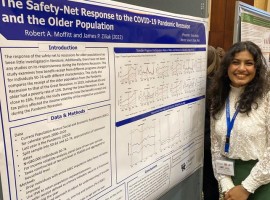Exploring the Psychology of Drug Addiction with William Stoops
“We are doing research funded by the National Institutes of Health, so at the end of the day, even if we're doing basic science research, we are contributing information that is going to positively impact the health of the taxpayer and the health of your fellow citizens. You should enjoy being able to do that and have that privilege to do that work.”
This is the perspective of William Stoops, a professor in the UK College of Medicine. UK substance abuse researchers, like Stoops, have a track record of successfully securing NIH funds for their projects. In 2017, 10 percent of all federal grants to the University of Kentucky were in the area of substance abuse.
Stoops credits his mentors at UK—Craig Rush (Behavioral Science) and Sharon Walsh (Center on Drug and Alcohol Research)—with developing his research and mentoring skills. He has focused on prescription stimulants, opioids, alcohol use, and cocaine use. In a new project, thanks to $2.9 million from the National Institute on Drug Abuse, Stoops will compare the health effects of reduced cocaine use with abstinence.
“There's been new data to suggest that overdose rates for cocaine, specifically in African-Americans, are at the same level as they are for opioid overdose in non-African-Americans. We don't have a way to reverse cocaine overdose the way we do for opioid overdose. We don't have any effective treatments. So, I see an unmet need.”
Listen to the podcast to learn more on how Stoops chose drug abuse research, why mentoring is one of his favorite parts of his job, and how the “can do” attitude across campus impacts success. Also see his People Behind Our Research video.
Have you ever wondered who was doing the research that will impact your future? The research podcast lets you met those people, and learn how the University of Kentucky is exploring and strengthening our understanding of the world through research and discovery.
Here's Alicia Gregory, director of Research Communications.
Alicia: Today we meet William Stoops, a professor in the departments of behavioral science and psychiatry in the UK College of Medicine. He focuses on drug use disorders, and he says research wasn’t initially on his radar.
William Stoops: when I graduated from high school and went to college, I was going to major in French or Political Science, and be a lawyer, and you know... Probably, my first or second semester, I took a psychology class and loved it, and decided, okay, no more French major, I'm going to be a psychology major. But still thought, well, I can be a psychology major and go to law school, and that's what I'll do. But, by junior year, I was taking sort of the more research-intensive classes; hands on research. And I thought, this is what I want to do with my life. Is I want to do research in the area of psychology.
I didn't really narrow it down to doing work related to drug use, behavioral effects of drugs, until really my senior year. And that was based on interactions I had with a specific faculty member at my college, who really inspired to do work that evaluates how drugs affect behavior, how behavior affects drugs, and that can help us understand and develop novel treatments for drug use disorders.
Alicia: So what was it about that particular aspect that kind of fascinated you?
William Stoops: I was fascinated by the idea that we can rigorously and scientifically study the effects of drugs; either in animals or in humans. You know, I think when the lay public thinks about drugs and drug use disorders, they think of it as, somebody has a loss of control, and they're an addict, and that's just all there is to it, but it's not as simple as that. And there's nuance to it. That, you know, drug use can be affected not only by the amount of drug somebody is using, or the drug of choice, but that the environment can impact drugs. And it's not as simple as, somebody is an addict or somebody has a drug use disorder, and that's it. There's so much more to it, and it's in that nuance where we can identify treatments and interventions, and even preventive interventions. And that's what really brought me to it. You know, the more nuanced understanding of how drugs act in living organisms.
Alicia: I saw that you earned your masters and your Ph.D. here at UK...
William Stoops: I did. I did.
Alicia: Who here at UK kind of mentored you?
William Stoops: Sure. So, I have a unique story that I came here straight out of college and got my Masters and Ph.D. in the Department of Psychology. I was Craig Rush's first graduate student. Craig had been here for maybe a year, and was kind enough to accept me in his lab at the same time he got a couple new, big projects. And so I did my masters and Ph.D. with him. Then, you know, you traditionally leave for your postdoc. You go somewhere else. Well, I had wanted the postdoc with Sharon Walsh, who at the time I was finishing my Ph.D., moved to UK from Johns Hopkins. So, I got to stay here and work with Sharon. So, my predoctoral work really focused on prescription stimulants. My postdoctoral work with Sharon Walsh was more about prescription opioids.
Alicia: I know nationally the conversation has really centered around opioids and heroin now.
William Stoops: Yes, yes.
Alicia: But cocaine is still an issue.
William Stoops: Yes.
Alicia: Can you talk a little bit about why- why are you doing cocaine research.
William Stoops: Of course, nationally we are focused on opioids; the opioid epidemic, opioid overdose. And we should be. It's absolutely a problem that we need to be bringing our best minds to bear on. But, you know, cocaine remains prevalent. About 1% of the population reports current use of cocaine. A little bit less than that meets criteria for cocaine use disorder. And the reason I've focused on cocaine is that stability of prevalence of use. We don't have any effective treatments. For opioid use disorder, we have approved medications to treat those problems. We have ways to intervene with overdose. For cocaine, we don't have a medication to treat cocaine use disorder. There's been new data to suggest that overdose rates for cocaine, specifically in African-Americans, are at the same level as they are for opioid overdose in non-African-Americans. We don't have a way to necessarily reverse cocaine overdose the way we do for opioid overdose. So, I see an unmet need for treatment development in cocaine use disorder that remains.
Alicia: So, tell me a little bit about your new grant for looking at the cardiovascular, immune, and psychosocial benefits of reduced cocaine use.
William Stoops: Sure, so the big idea for this grant is that, again we don't have treatments for cocaine use disorder. We don't have an FDA approved medication for cocaine use disorder. And some of that problem may arise from the fact that we, as a research and clinical community, have said that 100% abstinence from cocaine is what we're going to accept as the treatment outcome. And I think that's really interesting, and abstinence is of course something we should seek for folks. But, we don't have a lot of data to say what the benefits of abstinence are. We also don't any data to say that reduced use does or does not produce benefits. So, the goal of this is to look at abstinence versus reduction in cocaine use and look at a broad array of health outcomes. So, we know cocaine is very cardio toxic. We know that folks that use cocaine repeatedly have a lot of heart health problems. So, the primary outcomes are cardiovascular measures; common things like heart rate and blood pressure, as well as biomarkers of, you know, sort of cardiac function. So, something that could potentially be simply drawn in a doctor's office to look at, you know, heart health of cocaine users. We also know cocaine use is associated with problems in the immune system. And so we want to look at immune response; both as a function of abstinence or reduced use. And then, being a psychologist, of course I care a lot about, you know, cognitive function, psychological health. So, we'll also monitor those aspects of people's lives as we either see reduced use or abstinence. We're hoping to then use these data to say, you know, reduction is an acceptable outcome. It may not be. Our data may say that reduction isn't beneficial, but we don't know. It can also be used to show, here are the benefits of abstinence, and this is why we should be pursuing abstinence over reduction. It's really a wide open question. Nobody's looked at this broadly in the drug use disorder field and certainly not in cocaine use disorder.
Alicia: And you also got a new grant for alcohol use disorder.
William Stoops: We did. The cocaine project is a five year, very, very large project. This project is a little bit smaller. So, we're going to use human laboratory methods to evaluate the behavioral effects of alcohol, and we're going to look at how maintenance on a medication called n-Acetylcysteine changes the effects of alcohol. Or whether it changes the effects of alcohol. And the reason we're going to do this is, human laboratory methods can give us insight into potential treatment efficacy before we actually do a large-scale clinical trial. So it's a small project to sort of screen how n-Acetylcysteine might or might not change alcohol use, might or might not change the subjective effects of alcohol, the physiological effects of alcohol, before we then ask the government to make a big investment in n-Acetylcysteine as a treatment for alcohol use disorder.
Alicia: So, tell me a little bit about the most challenging aspect of your research.
William Stoops: I think really the hardest aspect of the research is getting funding for it. All of my work is funded by NIH institutes and they have been very generous to our laboratory, to UK in general, but their budgets have stayed fairly flat, basically keeping up with the cost of inflation, and so, it's just very, very competitive to receive grant funding. I know that a lot of folks may look at sort of what is funded and think, well why is the government spending money on this or that? But, NIH actually has a great return on investment. Basic laboratory discoveries, clinical discoveries, really do affect human health. The small amount, relatively, that the government puts into NIH really does put a return on investment for individuals. But it also, because it is so competitive, truly only the best science is being funded. The peer review process is very constructively critical, but expert reviewers read everything that is put forward for funding, and they make their recommendations on the strength of the science to the institutes, and then the institutes really only pick the best stuff. And so, that makes it incredibly competitive, but that also ensures that the government is only investing in the best science that is most likely to have the best impact on human health.
Alicia: in your work, what have been some of the most fulfilling moments for you in terms of finding that evidence for the question that you're looking at?
William Stoops: I think back to my graduate work, and that was really focused on prescription stimulants. You know, drugs like Methylphenidate, which is marketed as Ritalin, amphetamine, which is part of what's in Adderall, and really understanding the behavioral effects of those drugs in people. Because while those drugs are commonly prescribed, we, at that time, didn't have a great grasp on the behavioral effects of those drugs that might contribute to abuse. That work really showed us that these drugs are not necessarily all that dissimilar from abused stimulants, like cocaine, or like methamphetamine, and that we need to approach their use with caution. That doesn't mean that they shouldn't be prescribed, but that they should be carefully monitored. My postdoctoral work was a similar theme with opioids. You know, we were looking at prescription opioids that had been used for decades, but we did not know a lot about their abuse liability, their abuse potential, and in fact, some of that work that I did as a postdoc was used to affect DEA scheduling of drugs. That work really was fulfilling both because it was scientific discovery, but it also had policy implications.
We did the first randomized trial of an intervention called Abstinence Reinforcement that we delivered online over the internet to rural smokers. So, it was really the idea of how can we limit, how can we reduce the barriers to getting treatment in individuals who really need it? We know that smoking rates are high in Kentucky in general, but especially high in Eastern Kentucky. It's hard to get treatment there, because the nearest clinician or the nearest treatment center is miles and miles, and hours away. It's not easy to get. And so, this was a small trial, but it was a randomized clinical trial of this intervention online. And we proved that it was effective. We proved that you could do it. And it's been part of a body of literature that spurred more work about m-health and mobile delivery of treatments for various drug use disorders.
And I think sort of the most recent fulfilling part of my career has been this new grant that we're getting started. I've been chasing after this idea of, you know, harm reduction and we need to know whether reduced drug use can translate into benefits that we think abstinence might confer. We need to empirically evaluate this and understand this. We know that for alcohol use disorder, reduction in alcohol heavy drinking days are an accepted treatment endpoint, because it's beneficial. We don't have those data for cocaine. So, it was very fulfilling to get that information from NIH saying we're going to support this project. We think this project is important. Check with me in five years, and I'll let you know how it turned out, but it's really fulfilling to have an idea that you've been trying to put into place for five years come and really get to start to do the work. And we're enrolling, and it's really exciting to see our research participants come in and be engaged in the project and start gathering the data.
Alicia: So, for you, what is your favorite part of being in research?
William Stoops: I think my most favorite part of being in research is the mentoring aspects. I have graduate students I work with, I have postdoctoral fellows I work with. I also have faculty, you know, sort of early career faculty I work with. And the mentoring, both formal and informal; about research ideas or professional development. Absolutely one of my favorite pieces. My collaboration with my colleagues, also, just something I really look forward to. I tell people I have the best job on the planet. Because I get paid to read and write and think and interact with really smart people all day. And I'm very thankful for that. Of course another favorite aspect is the scientific discovery. You know, getting to be able to develop hypotheses and generate studies to test those hypotheses and find out the answers. I have the best job on the planet, so I should have a lot of favorites about it.
Alicia: So tell me some of the ways that your research, and your experience in research, has impacted the way you train students.
William Stoops: I've been very lucky to have wonderful mentors, you know. I mentioned Craig Rush. I mentioned Sharon Walsh. Of course, I've had other mentors throughout my career, but those are my primary sort of academic mentors or formal mentor relationships. And so from them, I've learned a couple of really important things. First, I've learned how important it is to be in regular contact with your mentees, folks that are working with you. You need to build and maintain those relationships. And that doesn't mean that you micro-manage, but that means that you check in on a daily or, you know, weekly basis with the people who you're mentoring. Another thing is that you recognize as a mentor what your strengths are and what your weaknesses are, and that you're frank about it. That you say, here's what I'm good at, here's what I can help you with. But I recognize that I can't mentor you in all aspects of what your career is going to be, and let me help you find somebody else who can help you do that. The last thing that, you know, my mentors imparted to me, and that I hope to impart to my mentees, is that it is a lot of hard work, you are going to be in the lab a lot, you're going to put in a lot of time, but it's worth it. We are doing research funded by the National Institutes of Health, so we, at the end of the day, even if we're doing basic science research, we are contributing information that is going to positively impact the health of the taxpayer and the health of your fellow citizens. And you should enjoy it. You should enjoy being able to do that and have that privilege to do that work.
Alicia: So, tell me a little bit about what inspires you being here at the University of Kentucky.
William Stoops: when I got into graduate school, I thought, oh, you know, I'll go, and I'll be there for five years and then I'll move onto something else. And I, you know, all of a sudden it's 17 years, and so the environment here is just so collegial. It's easy to work here in that I've got great collaborators who want to see me succeed. I want to see them succeed. So, we all sort of work to benefit one another, and we like to share our findings and find where common collaborations can be. Everybody who works at UK has a goal of helping other people who work at UK succeed. So, I think about the Office of Research Integrity, various offices within the College of Medicine, they have a “can do” attitude rather than a “can't do” attitude. I talk to a lot of my friends, and they have to put up with can't do attitudes. But, by in large, being at UK, folks approach it with the mentality of how can I get you to what you want to do? How can I help you get there? It's about facilitating the work at UK rather than putting up roadblocks.
Thank you for listening to the Research Podcast. To subscribe to our podcasts on Soundcloud or iTunes, search University of Kentucky media and click news on our site; research.uky.edu.





